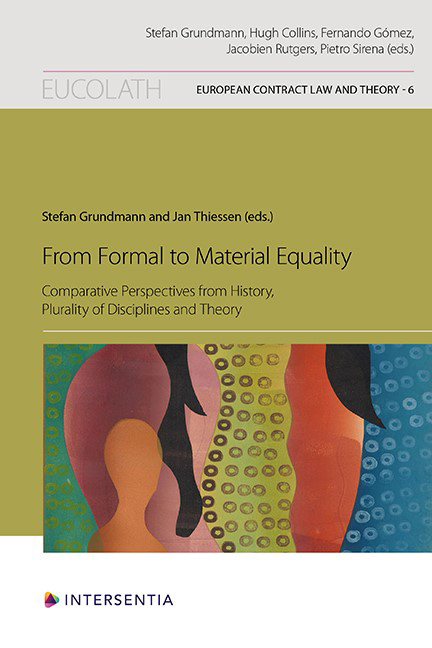 From Formal to Material Equality
From Formal to Material Equality Published online by Cambridge University Press: 15 November 2023
INTRODUCTION
The bearing of the principle of equality between private actors is yet to be adequately determined. Like the concept of justice itself, it must be separated from the dichotomy of iustitia distributiva and iustitia commutativa, which reflects the distinction between the State and society; between public and private relationships.
However, this reference to a dichotomy itself misses the point. Not only is a categorical division of the spheres of justice at odds with the actual structure of society and its proliferation into multiple subsystems, but it also reduces the right to equality to a mere instrument for the allocation of goods, to and between persons, across the board. Both the idea of an equal distribution of rights (in citizens’ relationships with each other), and the idea of an equal distribution of what is actually required to exercise such rights (a citizens’ claim against the State), miss the guarantee of freedom implied by these rights in general, and by the right to equality in particular. Both instances are based on an understanding of law that assimilates rights as possessions. From a procedural concept of law, this approach tends to “misunderstand the legal constitution of freedom as ‘ distribution’ and to assimilate it to the model of the equal distribution of acquired or allocated goods”. This characterisation implies a positivism of rights, legal entities, and rules of distribution, treating them all as pre-existing. The view of rights as an inventory of possessions and abilities ( “property”), implies a far reaching positivism, treating the individual, their goods, and the rules that apply to them as a given. This, almost inevitably, results in categorisation of rights in the relationship between private individuals as being rights of ownership or dominion, or exclusion rights; while the relationship between individuals and the State is framed as being characterised by rights of protection, or negative rights. But how can this be, if the individual cannot be assumed to be pre-existent? What, then, when options for action and communication do not yet exist, and must fi rst be generated?
Then, the law, including the right to equality, would have to be set to accommodate a potential mutual constitution of rights, personal identity, and social practice.
To save this book to your Kindle, first ensure [email protected] is added to your Approved Personal Document E-mail List under your Personal Document Settings on the Manage Your Content and Devices page of your Amazon account. Then enter the ‘name’ part of your Kindle email address below. Find out more about saving to your Kindle.
Note you can select to save to either the @free.kindle.com or @kindle.com variations. ‘@free.kindle.com’ emails are free but can only be saved to your device when it is connected to wi-fi. ‘@kindle.com’ emails can be delivered even when you are not connected to wi-fi, but note that service fees apply.
Find out more about the Kindle Personal Document Service.
To save content items to your account, please confirm that you agree to abide by our usage policies. If this is the first time you use this feature, you will be asked to authorise Cambridge Core to connect with your account. Find out more about saving content to Dropbox.
To save content items to your account, please confirm that you agree to abide by our usage policies. If this is the first time you use this feature, you will be asked to authorise Cambridge Core to connect with your account. Find out more about saving content to Google Drive.